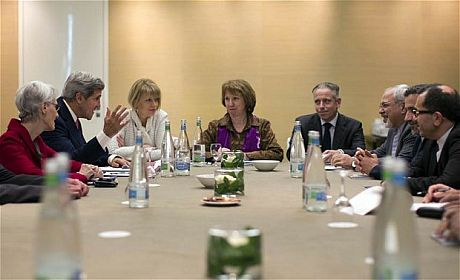Diplomatic Resistance

There is no doubt that the trend, objectives, events, reasons and the grounds for the Geneva negotiations could, in case of a correct and scientific analysis, open a new chapter in the literature of diplomatic resistance against greed and direct the trend of negotiations towards the main channel of a win-win game in foreign policy and international relations. In this round of negotiations, not only did the taboo of negotiations especially between Iran and the US break but it was also accepted that, through a real belief in negotiation and not using it as a tool, the differences and distances could be reduced. This issue, by itself, indicates a new trend in foreign policy and international relations which is not desirable for the countries whose role and philosophy of existence in the international scene is in the continuation of regional and international tensions; like the Zionist-Arab movement which made great efforts to halt the success of these negotiations, and unfortunately a correct strategy was not pursued against it.
The analysis of the context of what happened in Geneva is neither possible nor necessary due to reasons which cannot be explained in this essay. What Iran gives or takes in these negotiations is related to the analysis of the context which would only be speculations and pre-judgments until the outcome of these negotiations becomes clear. But the tradition that this round of negotiation has left in the scene of international relations is interesting. Look at the following hypotheses:
1- The West is in no hurry to reach an agreement with Iran.
2- All problems between Iran and the West are not summarized in the nuclear issue.
3- In case of resolving the nuclear issue, it cannot be expected that the West would remove the stick of sanctions from Iran’s head but certain issues would be resolved.
Of course, although no written agreement was reached in the negotiations which were pursued between Iran and the P5+1, it has unwritten agreements in its nature which can be considered as a turning points and guidelines based on observing the principles of negotiation, transparency in positions and perseverance over the principle positions and their correct interpretation. If the above-mentioned hypotheses are accepted, they must be pursued within the same framework by Iran. If we accept the hypothesis that the West is in no hurry to reach an agreement with Iran, then we must be patient and not insist on signing an agreement either, especially a bad agreement of which the damages are more than its benefits.
When reports of the unexpected visits of the foreign ministers to Geneva were spread, two analyses could be found in the political circles inside the country; either the negotiations had been successful and they had come to Geneva to sign the agreement or there were differences of opinion in dealing with Iran and imposing their ideas or demands between the P5+1 member countries which made the presence of the foreign ministers necessary for bargaining, gaining more concessions and resolving the problem. The trend of events proved the second hypothesis. But writing the guidelines and insisting on them took this opportunity away from the division of labor which had taken place in the P5+1; a division of labor wherein the US attempted to create the least tension between itself and the Iranian delegation, and this responsibility was on the shoulders of France this time.
The fact that the new administration in Iran is pursuing the path of negotiation with the West in its foreign policy shows its confidence and righteous positions and correct path. Through scientific criticism and constant study, the methods of negotiation and principles which must remain constant and the sub-principles on which one could maneuver could be improved. The foreign policy officials must create this atmosphere for analysts and the media to participate in this path and help advance the objectives of the foreign policy.

